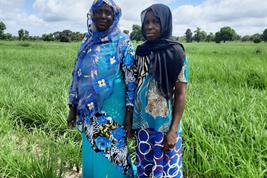14.02.2025

Climate change poses major challenges for agriculture in the Global South. A recent scientific study in The Gambia highlights the vulnerability of small farms, which depend on rainfall, are suffering from increasing droughts, flooding and extreme weather events. The study investigated how farms respond to these risks and identifies the key factors influencing thier adaptation measures. Notably, female farmers are less likely than their male counterparts to implement adaptation strategies due to limited access to critical resources and support. The research was conducted with the participation of the Leibniz Center for Agricultural Landscape Research (ZALF) and has been published in the journal Springer Nature Discover Sustainability.
For the study, 420 farms in three regions of The Gambia were surveyed. Farmers use both on-farm and off-farm strategies to mitigate climate risks. On-farm measures include growing drought-resistant crops, adopting improved cultivation techniques, and enhancing soil management. On the other hand, off-farm measures include seeking alternative income sources, such as small trading businesses or casual labor.
The study reveals that farmers’ decisions to adopt adaptation strategies depend on several factors, including land ownership, age and education level, market access, perception of climate change, membership in agricultural associations, access to advisory services and government support.
Women are significantly less likely to implement climate adaptation strategies. This is not only due to their limited access to land but also because of broader economic and social barriers, such as lower educational attainment and restricted access to credit and government aid. Consequently, women are more likely to rely on off-farm income sources, such as small businesses, to mitigate climate risks.
"Our research shows that targeted policy measures are needed to better support women farmers in The Gambia to cope with climate change," explains Dr. Fatima Lambarraa-Lehnhardt from ZALF, lead author of the study. "These include, for example, better advice, easier access to credit and specially tailored government support programs.
Need for action in politics and practice
The results of the study show that a combination of better information services, financial support and targeted support programs is needed to help farmers in The Gambia deal with climate change. Women in particular have received limited benefits from existing initiatives.
The researchers therefore recommend improving women's access to credit in The Gambia, expanding agricultural advisory services and implementing targeted support programs for women.
Transfer to policy and practice
The study was presented at the 32nd International Conference of Agricultural Economists (ICAE 2024) in India, an international conference on the transformation towards sustainable agricultural and food systems. There, the results were discussed with scientists, industry representatives and local development organizations.
For local stakeholders in The Gambia, the study results were also shared with agricultural organizations and the regional agricultural office, which also provided support in conducting the survey. In order to incorporate the findings into political decision-making processes in a targeted manner, the research team is currently preparing a policy brief that summarizes the key recommendations for political decision-makers.
The study’s recommendations have broader relevance for other countries facing similar climate challenges. While specific local conditions must be considered, the findings offer valuable insights into supporting smallholder farmers - especially women - in building resilience against climate change.
By addressing gender disparities and improving access to critical resources, policymakers can ensure that all farmers are better equipped to cope with climate risks and safeguard their livelihoods in an increasingly uncertain environment.
Further information:
Study: Climate risk perception and adaptation strategies of smallholder farmers in The Gambia DOI:
Note on the text: